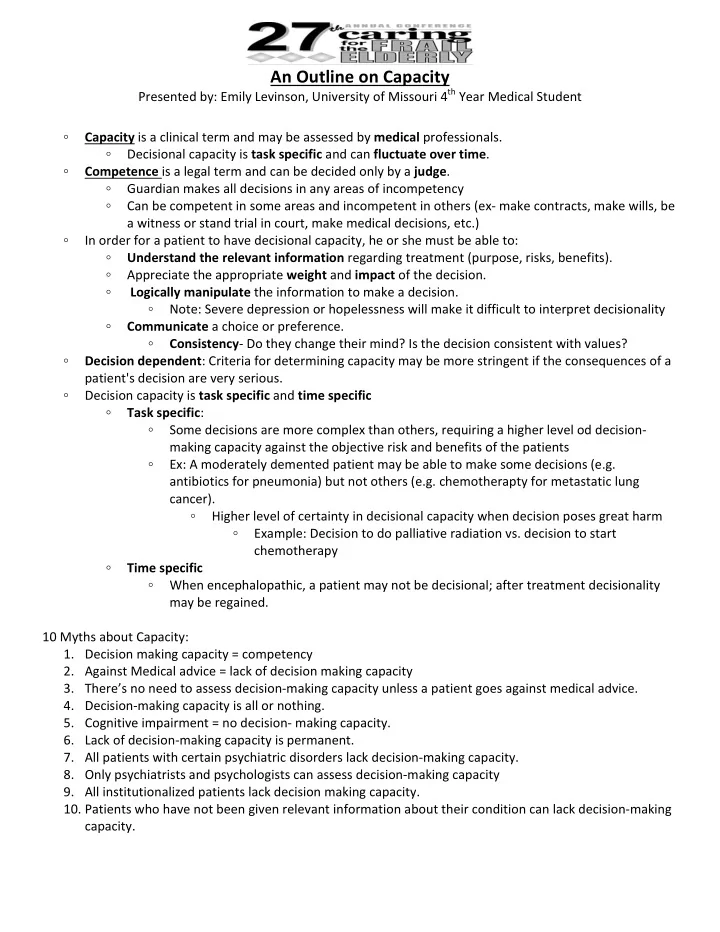

An Outline on Capacity Presented by: Emily Levinson, University of Missouri 4 th Year Medical Student Capacity is a clinical term and may be assessed by medical professionals. ◦ ◦ Decisional capacity is task specific and can fluctuate over time . ◦ Competence is a legal term and can be decided only by a judge . Guardian makes all decisions in any areas of incompetency ◦ ◦ Can be competent in some areas and incompetent in others (ex- make contracts, make wills, be a witness or stand trial in court, make medical decisions, etc.) In order for a patient to have decisional capacity, he or she must be able to: ◦ ◦ Understand the relevant information regarding treatment (purpose, risks, benefits). Appreciate the appropriate weight and impact of the decision. ◦ Logically manipulate the information to make a decision. ◦ ◦ Note: Severe depression or hopelessness will make it difficult to interpret decisionality Communicate a choice or preference. ◦ ◦ Consistency - Do they change their mind? Is the decision consistent with values? ◦ Decision dependent : Criteria for determining capacity may be more stringent if the consequences of a patient's decision are very serious. ◦ Decision capacity is task specific and time specific Task specific : ◦ Some decisions are more complex than others, requiring a higher level od decision- ◦ making capacity against the objective risk and benefits of the patients Ex: A moderately demented patient may be able to make some decisions (e.g. ◦ antibiotics for pneumonia) but not others (e.g. chemotherapty for metastatic lung cancer). ◦ Higher level of certainty in decisional capacity when decision poses great harm Example: Decision to do palliative radiation vs. decision to start ◦ chemotherapy Time specific ◦ When encephalopathic, a patient may not be decisional; after treatment decisionality ◦ may be regained. 10 Myths about Capacity: 1. Decision making capacity = competency 2. Against Medical advice = lack of decision making capacity 3. There’s no need to assess decision-making capacity unless a patient goes against medical advice. 4. Decision-making capacity is all or nothing. 5. Cognitive impairment = no decision- making capacity. 6. Lack of decision-making capacity is permanent. 7. All patients with certain psychiatric disorders lack decision-making capacity. 8. Only psychiatrists and psychologists can assess decision-making capacity 9. All institutionalized patients lack decision making capacity. 10. Patients who have not been given relevant information about their condition can lack decision-making capacity.
Aid to capacity evaluation Name of patient: _____________________________________________________________________________________________________ Record observations that support your score in each domain, including exact responses of the patient. Indicate your score for each domain with a check mark. ■ Yes 1. Able to understand medical problem ■ Unsure (Sample questions: What problem are you having right now? What problem is bothering you most? Why are you in the hospital? Do you have [name problem here]?) ■ No Observations: _________________________________________________________________________________________ ____________________________________________________________________________________________________ ■ Yes 2. Able to understand proposed treatment ■ Unsure (Sample questions: What is the treatment for [your problem]? What else can we do to help you? Can you have [proposed treatment]?) ■ No Observations: _________________________________________________________________________________________ ____________________________________________________________________________________________________ 3. Able to understand alternative to proposed treatment (if any) ■ Yes ■ Unsure (Sample questions: Are there any other [treatments]? What other options do you have? Can you have [alternative treatment]?) ■ No Observations: _________________________________________________________________________________________ ■ None ____________________________________________________________________________________________________ disclosed 4. Able to understand option of refusing proposed treatment (including withholding or withdrawing proposed treatment) ■ Yes ■ Unsure (Sample questions: Can you refuse [proposed treatment]? Can we stop [proposed treatment]?) ■ No Observations: _________________________________________________________________________________________ ____________________________________________________________________________________________________ ■ Yes 5. Able to appreciate reasonably foreseeable consequences of accepting proposed treatment ■ Unsure (Sample questions: What could happen to you if you have [proposed treatment]? Can [proposed treatment] cause problems/side effects? Can [proposed treatment] help you live longer?) ■ No Observations: _________________________________________________________________________________________ ____________________________________________________________________________________________________ 6. Able to appreciate reasonable foreseeable consequences of refusing proposed treatment (including ■ Yes withholding or withdrawing proposed treatment) ■ Unsure (Sample questions: What could happen if you don’t have [proposed treatment]? Could you get sicker/die if you don’t have [proposed treatment]? What could happen if you have [alternative treatment]? [If alternatives are available]) ■ No Observations: _________________________________________________________________________________________ ____________________________________________________________________________________________________ NOTE : for questions 7a and 7b, a “yes” answer means the person’s decision is affected by depression or psychosis. ■ Yes 7a. The person’s decision is affected by depression. ■ Unsure (Sample questions: Can you help me understand why you’ve decided to accept/refuse treatment? Do you feel that you’re being punished? Do you think you’re a bad person? Do you have any hope for the future? Do you deserve to be treated?) ■ No Observations: _________________________________________________________________________________________ ____________________________________________________________________________________________________ ■ Yes 7b. The person’s decision is affected by delusion/psychosis. ■ Unsure (Sample questions: Can you help me understand why you’ve decided to accept/refuse treatment? Do you think anyone is trying to hurt/harm you? Do you trust your doctor/nurse?) ■ No Observations: _________________________________________________________________________________________ ____________________________________________________________________________________________________
References Jones RC, Holden T. A guide to assessing decision-making capacity. Cleve Clin J Med. 2004; 71: 971-5. ◦ Ganzini L, Volicer L, Nelson WA, Fox E, Derse AR. Ten myths about decisionmaking capacity. J Am Med ◦ Dir Assoc. 2004;5(4):263-267. Tunzi, Marc, M.D. Can the Patient Decide? Evaluating Patient Capacity in Practice. Am Fam Physicians. ◦ 2001 Jul 15;64(2):229-308 ◦ Arnold, Robert, MD. Fast Facts and Concepts #55: Decision Making Capacity. Palliative Care Network of Wisconsin. https://www.mypcnow.org/blank-v7dyv Blitzstein, Sean M. Lange Q&A Psychiatry, 10 th Edition. McGraw Hills: 2011. ◦ ◦ Drickamer MA. Assessment of Decisional Capacity and Competencies. In: Halter JB, Ouslander JG, Studenski S, High KP, Asthana S, Supiano MA, Ritchie C. eds. Hazzard's Geriatric Medicine and Gerontology, 7e New York, NY: McGraw- Hill; . http://accessmedicine.mhmedical.com.proxy.mul.missouri.edu/content.aspx?bookid=1923§i onid=144518097. Accessed August 10, 2017. Karlwawish, Jason MD. Assessment of Decision-making capacity in adults. Uptodate. ◦ https://www.uptodate.com/contents/assessment-of-decision-making-capacity-in- adults?source=search_result&search=capacity&selectedTitle=1~150
Recommend
More recommend